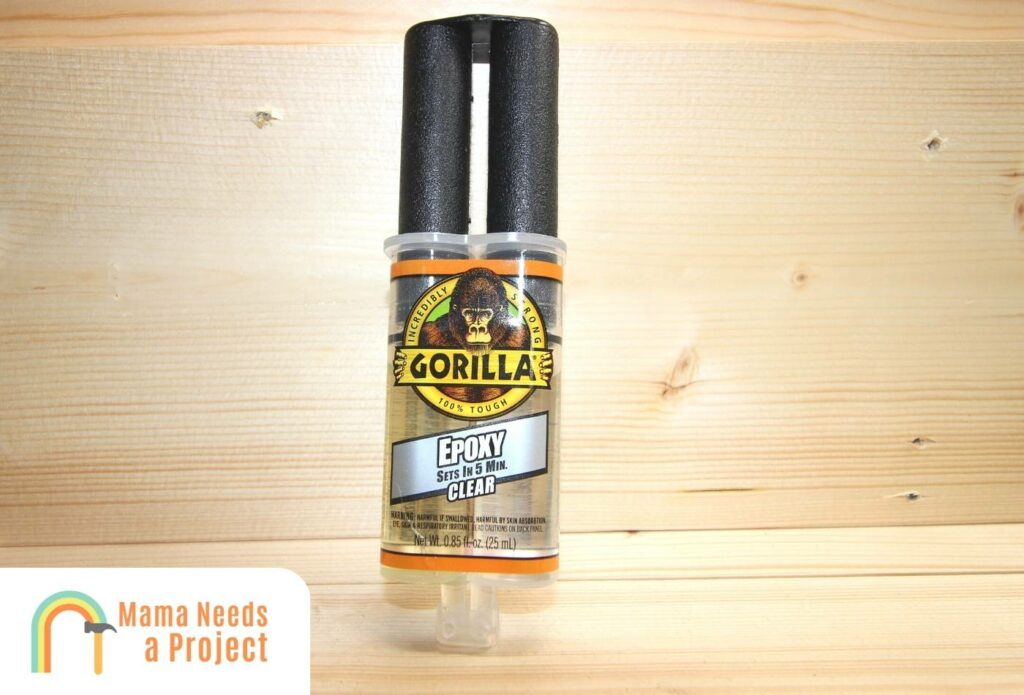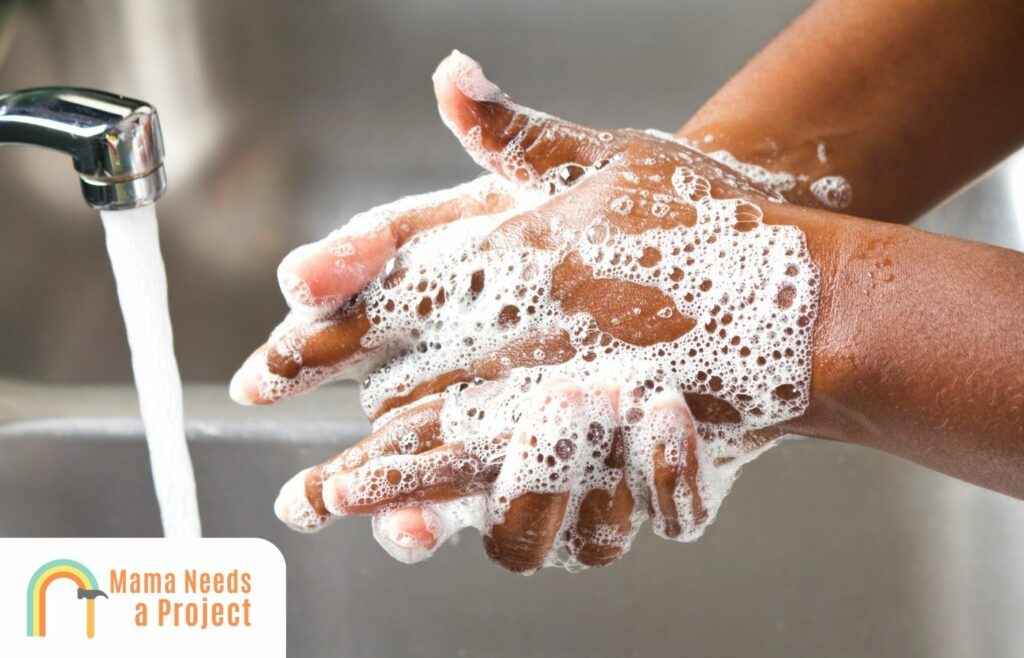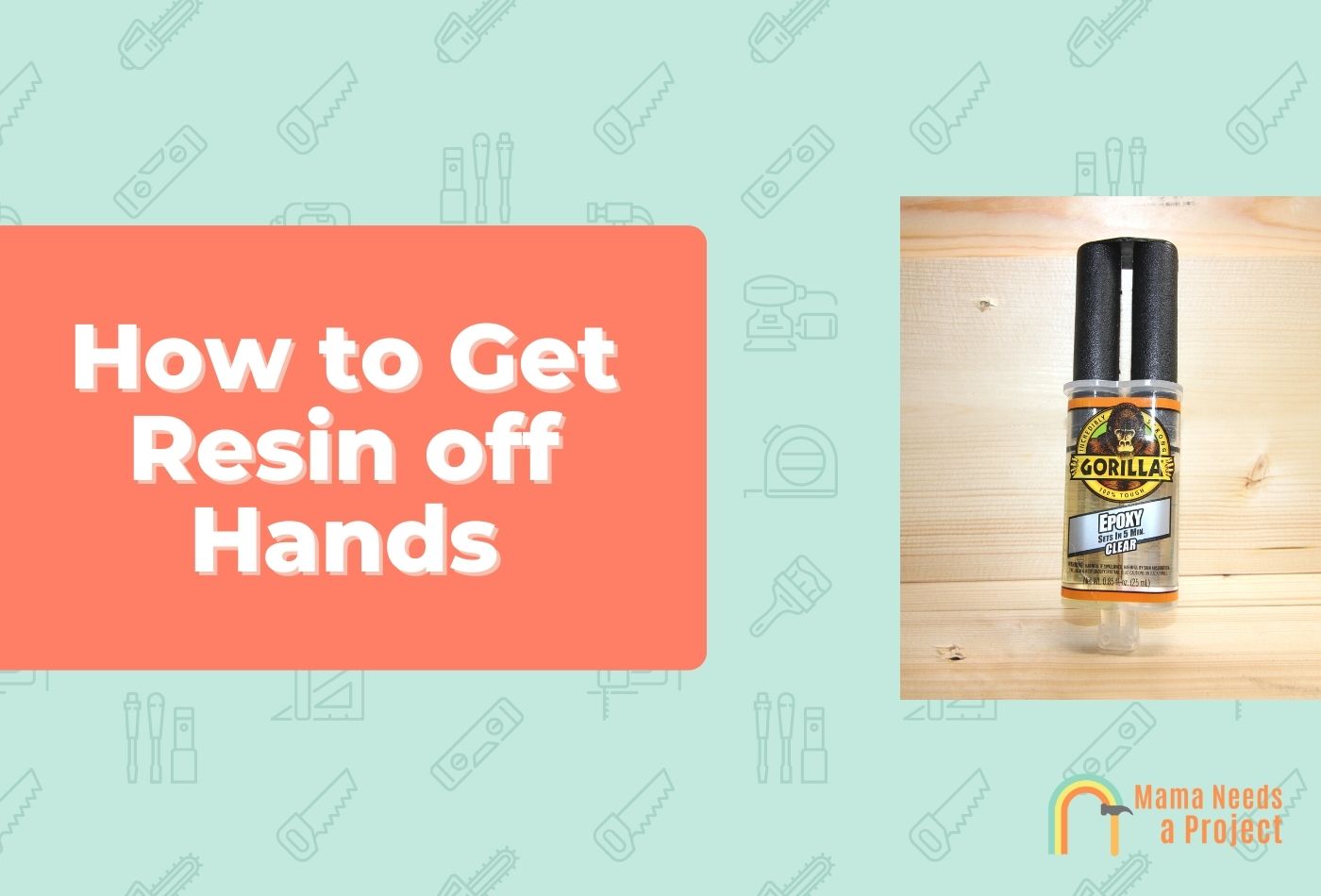How to Get Resin off Hands Fast (& Safely)
Did you accidentally get resin on your hands? Don’t panic! You have nothing to worry about if you take care of it quickly.
As an adhesive, epoxy resin is going to feel really sticky on your skin. It may even cause an irritating skin reaction. But this is totally avoidable if you take action sooner rather than later!
In this post, I’m going to cover the fastest, simplest, and safest ways to clean resin off your hands. These are pretty fool-proof, and very effective. So let’s get into it!
- You can get epoxy resin off your hands using dish soap and water, baking soda, a sugar or salt scrub, or diluted apple cider vinegar.
- Avoid using solvents like hand sanitizer, rubbing alcohol, and acetone to clean resin off your hands.
- Because epoxy resin can cause acute contact dermatitis or skin irritation when it gets onto skin, try to remove it as quickly as you can.
What is Epoxy Resin?

Epoxy resin is a very handy and versatile compound. It’s a class of polymers and prepolymers that forms a strong, durable substance when reacted with hardeners or curing agents.
Resin can be used to make art, or as an adhesive or surface sealant in building construction.
It’s commonly used for many different construction and woodworking projects as an adhesive (you can actually sub wood glue for epoxy!), a protective surface coating, or even for unique custom art.
I’m kind of obsessed with all the amazing creations from talented resin artists out there, like Heather Dandurand (aka, Artsy Mad Woman).
It’s also super useful to have on hand if you notice that gorgeous wood furniture in your house is starting to crack.
Epoxy resin contains four ingredients: monomeric resin, an accelerator, a plasticizer, and a hardener.
This combination of ingredients is known to cause acute contact dermatitis or skin inflammation, especially in people with sensitive skin.
So when you’re working with resin, there’s a chance it can drip onto your hands or arms by accident.
How to Get Resin off Hands Fast & Safely
So it’s finally happened–the dreaded epoxy resin splatter on your hands.
Luckily, epoxy resin isn’t highly toxic or dangerous to touch. And it won’t affect you at all if you clean it off as soon as you notice it. Removing epoxy resin is actually easier than you might think.
The only time I’d urge you to take action and seek medical attention is if the resin gets in your eyes.
Before I get into the different methods for cleaning the resin off your hands, I want to mention that you should always apply a moisturizer to your skin after cleansing.
This stuff has chemicals that are drying, and your vigorous scrubbing will dry your skin out even more.
Okay okay, enough side notes. Let’s jump into the fastest and safest methods for how to get resin off hands fast.
1. Liquid Soap & Water

The most sure-fire method (plus cheap and convenient!) for cleaning resin off your hands is good ol’ trusty dish soap or hand soap with warm water.
All you need is a dollop of soap in the palm of your hand and some warm water to get it sudsy. Firmly lather your hands for at least 20 seconds, then rinse. Repeat this process 2-3 times to ensure all the resin cleans off.
If the resin had enough time to adhere to your skin and get sticky, you may need to take more extreme measures.
This is when you’ll want to break out a pumice soap, or face scrub mixed with your regular hand or dish soap. The grit will help remove the adhesive goo from your skin.
You’ll be surprised how well warm soapy water can removing epoxy from your skin, so this is what I’d recommend trying first!
Bonus: This method can also be used to get Gorilla glue off your skin!
2. Baking Soda
Next up to bat on our resin-neutralizing mission is baking soda, the unsung hero of natural cleaning agents.
This is another cheap, easy method that you hopefully don’t even need to make a trip to the store for. If you bake a lot, you might already have it in your pantry!
Here’s what to do with the baking soda:
- Pour 1 tbsp of baking soda into the palm of your hand.
- Pump 1 tbsp of liquid dish or hand soap on top of the baking soda.
- Bring your hands together over the sink and start scrubbing with firm pressure.
- Rinse your hands off under warm water.
- Repeat if your skin still feels tacky.
- Apply moisturizer when complete.
So simple, quick, and easy. Nothing harmful in there for your skin, either! It’s a win-win.
3. Natural Sugar or Salt Scrub
If you’re into natural exfoliating scrubs, you’ll love this one. Keep in mind, this method will take slightly more work and ingredients than the other options.
But it’s a worthy investment if you already enjoy using scrubs for your regular beauty routine. It’s also great for your skin health.
Natural scrubs are great, because they cleanse the resin off your skin safely and effectively, while simultaneously moisturizing your skin.
Here are the components of a natural scrub: an oil base, and a gritty ingredient (either sea salt or sugar, your choice). Add drops of essential oil to give it that delectable aroma.
Follow this natural sugar scrub recipe (salt works too!):
- 2 cups of raw sugar or coarse sea salt
- ½ cup of cold-pressed virgin oil
- Coconut oil
- Grapeseed oil
- Avocado oil
- 20 drops of essential oil
- Tea tree oil
- Jojoba oil
- Carrot seed oil
- Sweet almond oil
Mix it all together in a container that you can store it in. Then simply scoop up a couple tablespoons into your hand, and start scrubbing over the sink. Rinse off, and repeat again if needed.
Check out this guide to learn how to get polyurethane off your skin!
4. Diluted Apple Cider Vinegar

Last but not least, use diluted apple cider vinegar to remove epoxy from your body.
If I had to add a little warning label on this one, it would be this: rubbing vinegar is a very acidic solution that isn’t the gentlest on your skin. It can be quite drying and cause redness.
So you’ll want to first ensure that you dilute the apple cider vinegar with some water. This just makes it less potent.
Here’s how you’ll use apple cider vinegar to clean resin off your hands:
- Pour 1 cup of apple cider vinegar into a bowl.
- Add ¼ a cup of water into the bowl, and mix the solution together.
- Take a rag or paper towel, and dip it into the mixture so it’s saturated enough but not dripping-wet.
- Start rubbing the resin spots on your hands with the paper towel until it’s all cleaned off.
TIP: Vinegar can also be great to remove JB weld from many different surfaces.
What Not to Use When Cleaning Resin off Hands
Okay, I’m here to set the record straight. There are a lot of problematic recommendations floating around Google for how to remove epoxy from skin.
Many of them contain harmful chemicals that will only exacerbate the skin reactions we’re trying to avoid in the first place.
So here’s what not to use when cleaning resin off hands, especially if you care about skin safety:
- Acetone (nail polish remover)
- Rubbing or isopropyl alcohol
- Disinfectant wipes
- Hand sanitizer
- White spirits
Why should you avoid using these solutions to clean off the resin? These are all solvents. Solvent liquids like these are effective at breaking down resin, but they also penetrate your skin in the process.
This, just like the resin, can cause contact dermatitis, rashes, and other types of skin inflammation.
What About Removing Resin from Clothes?
Okay, so what if the resin didn’t spill on your hands, but rather on your clothing? Well, it’s a little bit more straightforward to clean resin from your clothes.
Since it’s safer to use solvents on your clothes (unlike your skin), you can use rubbing alcohol or acetone to remove the resin stain.
The process is simple: all you have to do is apply rubbing alcohol or acetone to a cotton pad or a paper towel, and vigorously rub the stain until it clears.
Another important step after you’ve applied the solvent to your garment is to wash it in the washing machine as soon as possible.
Protecting Your Skin from Resin
Your hands aren’t the only area of skin at risk of resin spills. Your arms, legs, face, and really any other exposed area of skin can be touched when working with resin.
When the resin touches your skin once, nothing horrible will happen. But if you work with epoxy resin regularly, repeated skin contact can cause chronic contact dermatitis or even eczema.
Symptoms might include swelling skin, itchiness, redness, and blisters.
Chronic contact dermatitis is milder than acute contact dermatitis, but lasts longer and is harder to get rid of.
Let’s explore the most effective ways to practice using epoxy resin safely.
Epoxy Resin Safety
Whenever you work with epoxy resin, you’ll want to take certain precautions by wearing certain safety gear. Prior to curing, when epoxy is in its resin form, it poses as a mild skin irritant as mentioned.
This means the most important priority is to protect your skin from making contact with the resin. FYI–you should always be wearing nitrile gloves when working with resin!
Keep your skin safe by taking these measures:
- Wear a long-sleeved shirt
- Wear disposable nitrile gloves
- Wear an apron that covers your legs, or long pants
- Always wash hands and arms after working with resin, even if you don’t notice any spills
- Wear eye protection, like safety goggles
- Work with the resin in a properly ventilated room to avoid excessive inhalation
If you take these steps to protect your eyes and skin from resin contact, you’ll have nothing to worry about. And even if an unfortunate accident happens, you now know how to clean it off fast!
FAQs
Can hand sanitizer remove resin?
Hand sanitizer can help remove resin, since it’s a solvent. But hand sanitizer should not be used to remove resin from skin, only on material objects like clothing.
Nail polish remover is similar. It can remove resin, but should not be used on skin.
What happens if resin gets on your skin?
If resin gets on your skin, don’t panic! Just take quick steps to clean it off with dish soap and water, baking soda, or a gritty scrub.
If the resin sits on your skin for too long, it may cause acute contact dermatitis or skin inflammation.
If you repeatedly get resin on your hands from working with it regularly, it may cause chronic contact dermatitis or eczema.
Is epoxy resin toxic to skin?
The chemicals in resin can cause mild skin irritation. Resin is not a dangerous substance, though. Once it’s cured, epoxy resin is relatively safe. It’s only when the epoxy is still in its liquid form that it may cause dermatitis.
Final Thoughts
If you work with epoxy resin regularly, or are using it for the first time, you may be concerned about its toxicity. Believe it or not, it’s quite easy to remove epoxy resin from your skin.
Luckily, if it comes into contact with your skin, it may only cause mild irritation and redness.
All you have to do is grab some soap and water, a natural salt or sugar scrub, diluted apple cider vinegar, or baking soda and get to scrubbing.
Your hands will be resin-free in a jiffy, no damage done. And don’t forget that final step–moisturize!

Jessica Vaillancourt is a freelance writer and blogger obsessed with the Travel, Wellness, and Personal Development industries.
She has 5+ years of experience helping human-first agencies, global companies, and entrepreneurs crush their content marketing goals, and serve more people. Jessica’s work has appeared on leading websites like UpgradedHome.com, BetterHelp.com, and TheDiaryofaNomad.com.
Today, her sole focus (besides finding the world’s best coffee shop) is writing to serve humans, and slow traveling abroad to expand her mind. You can get to know her work at JessAnneWriting.com.

